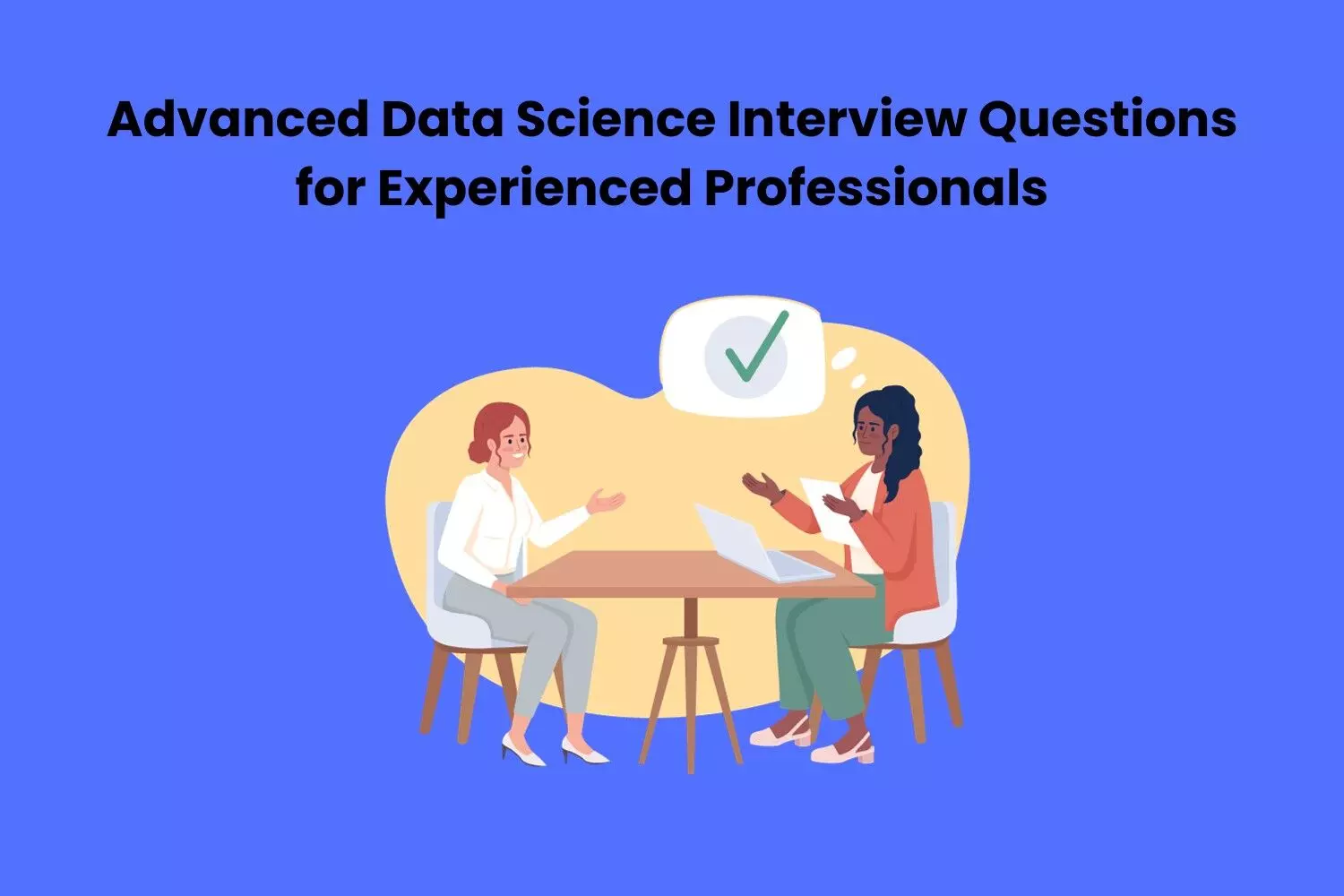Live
- Railways reduces time limit for advance ticket booking from 120 to 60 days
- N. Manoj Reddy Takes Charge as Kadapa Municipal Commissioner, says will develop Kadapa
- Maharshi Valmiki's Birth Anniversary Celebrations held at Telangana Bhavan in New Delhi
- Maharashtra polls: Give 12 seats or will quit, Samajwadi Party warns MVA
- South Korea's rival parties win local by-elections in each own stronghold
- Manoj Reddy Takes Charge as Kadapa Municipal Commissioner, Vows to Enhance Development
- Alternative fuels can drastically cut logistics costs, air pollution: Nitin Gadkari
- Andhra Pradesh is Open for Investment with New Policies," says Chandrababu Naidu
- Sudan highlights commitment to achieving food security on World Food Day
- Dasara box-office disappoints Telugu audience
Just In
Advanced Data Science Interview Questions for Experienced Professionals


As the field of data science continues to evolve, the demand for experienced professionals with advanced skills in data analysis, machine learning,...
As the field of data science continues to evolve, the demand for experienced professionals with advanced skills in data analysis, machine learning, and statistical modeling is on the rise. Data science interviews for experienced professionals are often rigorous and require a deep understanding of complex concepts and techniques. This blog aims to explore some advanced Data Science Interview Questions that are commonly asked during interviews for experienced data scientists. Additionally, it will highlight the importance of ongoing Data Science Training to stay abreast of the latest trends and techniques in the field.
Table of Contents
• Importance of Data Science Interview Questions
• Advanced-Data Science Interview Questions
• The Role of Data Science Training in Interview Preparation
• Conclusion
Importance of Data Science Interview Questions
There are several uses for data science interview questions for seasoned workers. First, they assist employers in determining the breadth of a candidate's comprehension and proficiency with data science principles and methods. Second, applicants can demonstrate their capacity for critical thought and problem-solving about intricate data-related concerns. Finally, they help both sides determine if the applicant is a good match for the position and the company's particular requirements.
Advanced-Data Science Interview Questions
1. Explain the Bias-Variance Tradeoff in Machine Learning: This test evaluates the candidate's comprehension of how machine learning models balance model complexity and generalization error.
2. Discuss the Pros and Cons of Different Feature Selection Methods: This test assesses the candidate's understanding of different feature selection methods and how well they work in diverse contexts.
3. Describe the Process of Hyperparameter Tuning in Machine Learning: It is possible to question candidates to describe how model performance is affected by hyperparameters and the methods used to optimize them.
4. Discuss the Differences Between Supervised and Unsupervised Learning Algorithms: This question aims to evaluate the candidate's comprehension of the key distinctions between these two categories of machine learning techniques.
5. Explain the Concept of Regularization in Machine Learning: Candidates should be able to explain how regularization techniques such as L1 and L2 regularization help prevent overfitting in machine learning models.
6. Describe the Steps Involved in Building a Recommender System: This question assesses the candidate's understanding of the steps involved in developing a recommender system, such as selecting, evaluating, and preparing data.
7. Discuss the Role of A/B Testing in Data Science: Candidates may be asked to explain how A/B testing is used to evaluate the effectiveness of new features or changes in a product or service.
8. Explain the Difference Between Bagging and Boosting in Ensemble Learning: This question evaluates the candidate's understanding of ensemble learning techniques and their applications.
9. Discuss the Challenges of Working with Big Data: Candidates should be able to articulate the challenges associated with processing and analyzing large volumes of data, including issues related to scalability, performance, and privacy.
10. Describe a Data Science Project You Led and Its Impact: Candidates may be asked to discuss a real-world data science project they have worked on, including their role, the techniques used, and the project's outcomes.
The Role of Data Science Training in Interview Preparation
A thorough grasp of advanced data science methods and core principles is necessary to prepare for advanced data science interview questions. Experienced professionals may benefit from data science training programmes by staying current with emerging trends and technology in the industry, which will provide them with the information and abilities necessary to succeed in job interviews and other professional settings. These courses often address cutting-edge subjects like deep learning, natural language processing, big data technology, and sophisticated statistical techniques, equipping professionals to confidently tackle challenging data science problems.
Conclusion
Advanced data science interview questions are intended to evaluate applicants' mastery of data science principles and their capacity to apply them to practical issues. Applicants should be ready to demonstrate their knowledge and problem-solving abilities while discussing advanced subjects in statistical modelling, data analysis, and machine learning. For professionals to progress in their professions and maintain their competitiveness in the quickly changing area of data science, ongoing training is crucial for keeping up with the most recent advancements in the industry and preparing for advanced data science interviews.

© 2024 Hyderabad Media House Limited/The Hans India. All rights reserved. Powered by hocalwire.com






